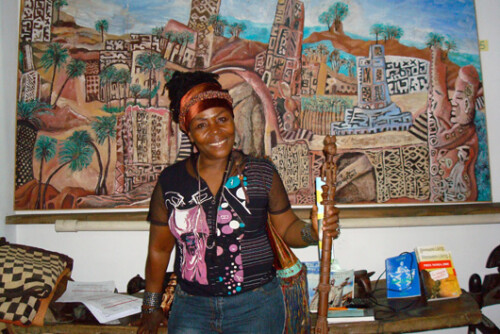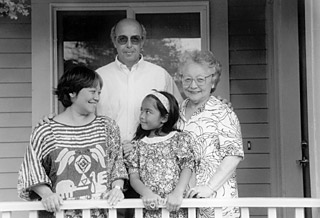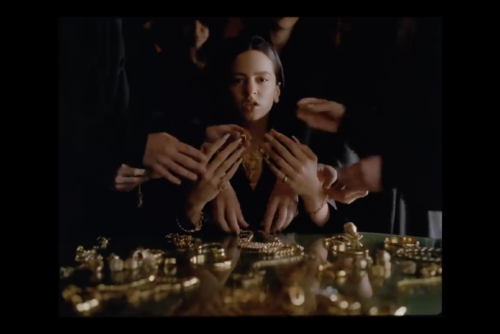What do you believe is the mother’s place in contemporary “Western Feminism” or “Third World Feminism?”
Where should she be except where she is? My belief is, first of all, don’t put feminism in quotes, because it’s a valuable ideological concept. I believe, as a feminist, that motherhood is important, very important. But a woman’s worth, a woman’s life, can still be valid, productive, and interesting outside of motherhood. I don’t believe that if a woman doesn’t have children then it’s like she might as well not have been born. That’s mad. I repudiate that belief completely.
Do you feel that the categories between “Western Feminism” and “Third World Feminism” are arbitrary? Are they really the same thing?
Well, I’m too tired of speaking to that controversy. It’s something that I’m interested in, that I’ve been confronted with, but it takes too much to explain. I don’t believe in Western Feminism in Africa. It’s like saying, what’s the difference between African Christians and Western Christians? There is no difference. There shouldn’t be. Except that with Western-ness, in feminism as in religion, you have a feeling that people—if you’re talking about the West as in white—don’t see you. They don’t reckon you as part of the essential data. Automatically.
Every morning, we reckon them as part of our essential data. People don’t seem to be aware that when an African woman is considering her world, or the world, automatically she does not take in the white world. The only thing is that, because we don’t have that much power, whites don’t feel the fight. We don’t reckon with them. We do feel the fact that to the Western world, the women, feminists, we are not alive to them. But because they control so much in terms of the power of our contemporary world, then we feel marginalized. That’s all.
Do you believe that there’s a relationship between literature produced in Africa and literature produced in the Diaspora? Are there any themes that come across in both African and diasporic works?
Well, the thing is, insofar as we all write about people of Africa and African descent, then our work is related. Because sooner or later, you are going to find certain trends in some African writer’s work, which you are quite convinced reminds you of something you have already read. You know, a word, a sentence, a viewpoint, a certain character, because basically we are all writing about people of a common stock. There is something like an African, there’s something like a person of African descent. There must be a viewpoint that is African and therefore a viewpoint that a writer of African descent has.
As somebody who visits the United States from Africa, sometimes when I listen to African-Americans, it’s like I get goose bumps. I hear other things. Echoes. Of people or statements. Rap. The reason I adopted an open mind about rap right from the beginning is because I was hearing something different altogether. When you take away the terrible language, then rap is like word play that comes all the way from Africa. And that’s why these Afro-beat kids have taken to rapping in all sorts of African languages. It’s because it is so easy for them. It’s like race consciousness. You are not aware that it is part of your make-up, but obviously there must be some memory. And so when they started rapping in the U.S., it was easy for these African musicians to imitate them, and start rapping in Akan and other African languages. Now, on the whole continent, contemporary musicians are rapping all over the place. And people can get themselves bent all out of shape, because they are “ruining music.” They don’t know. It is not ruining anything. It is another form of African music or word play.
So, in terms of writing, I think what we should do to make something interesting, for ourselves, our readers, and the students who study our work, is to be aware of the details. The fact that there is a relationship between writing in Africa and writing in the Diaspora shouldn’t even be an interesting question. That relationship is a relationship we should take for granted, of course. The question is how. What are we seeing? What are we hearing? In what way would you say that something that Maryse Condé does in her work, I also do in my work? What echoes are there? What continuities? These are questions that are interesting. Is there anything like an African literature that is not just African because it’s written by somebody who lives on the continent? Yes.



